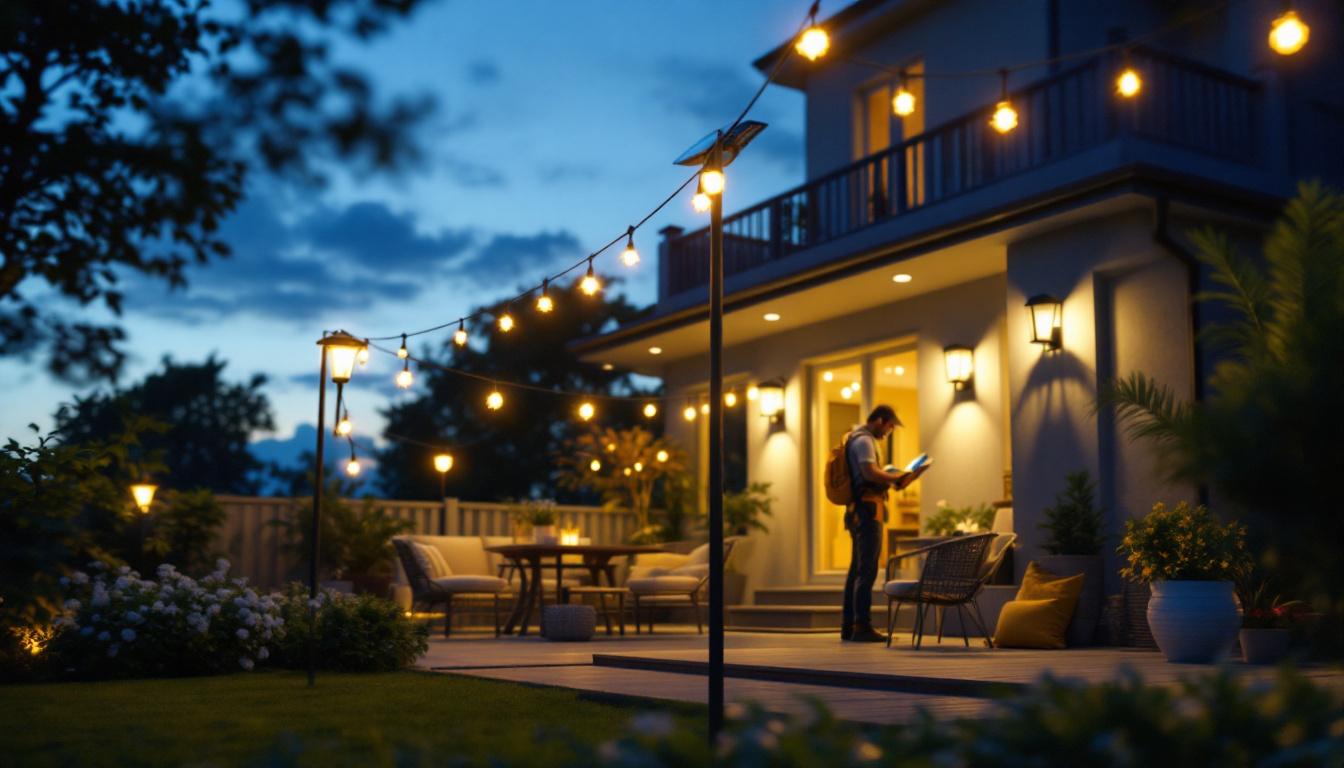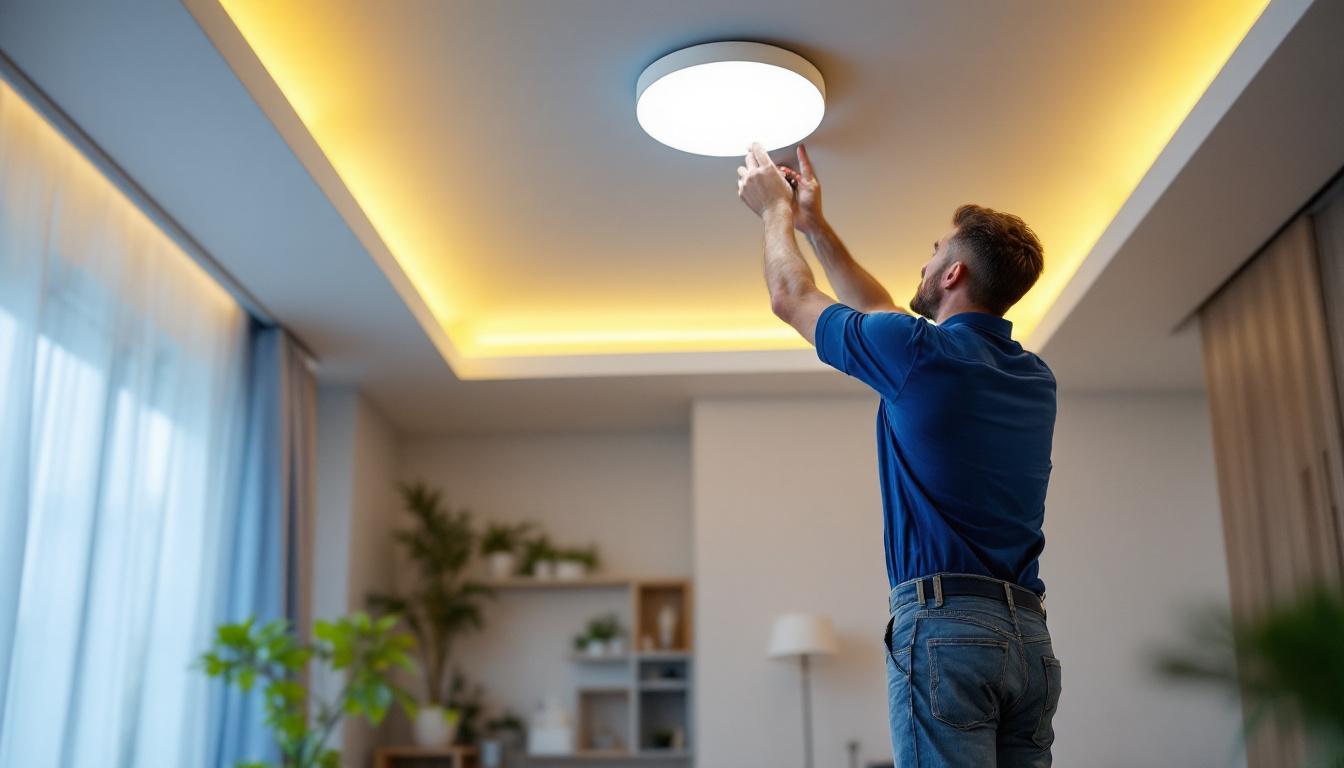
In the realm of residential lighting, achieving the perfect balance between functionality and aesthetics is paramount. Lighting contractors play a crucial role in transforming spaces through their expertise and knowledge of best practices. This article delves into essential strategies and considerations that lighting contractors should keep in mind when working on household projects.
Before diving into specific practices, it’s essential for lighting contractors to grasp the foundational concepts of residential lighting. This understanding not only enhances the quality of installations but also ensures client satisfaction. A solid grasp of lighting principles can also empower contractors to make informed decisions that align with the latest trends and technologies in the industry, ultimately leading to more innovative and effective solutions for their clients.
Layered lighting is a fundamental principle that involves the combination of ambient, task, and accent lighting. Ambient lighting provides overall illumination, task lighting focuses on specific areas for activities like reading or cooking, and accent lighting highlights architectural features or artwork. By incorporating all three layers, contractors can create a well-balanced and inviting atmosphere. This approach not only enhances the functionality of a space but also contributes to its aesthetic appeal, allowing homeowners to enjoy their environments in a more versatile way.
When planning a lighting scheme, it’s crucial to assess the purpose of each room. For instance, a kitchen may require bright task lighting for food preparation, while a living room could benefit from softer ambient lighting for relaxation. Understanding these needs allows contractors to tailor their designs effectively. Moreover, considering the natural light available in each room can further inform the lighting strategy. Rooms with ample sunlight during the day may need less artificial lighting, while darker spaces might require more robust solutions to ensure comfort and usability throughout the day and night.
The selection of fixtures can significantly impact the overall aesthetic and functionality of a space. Lighting contractors should consider factors such as style, size, and energy efficiency when recommending fixtures to clients. For example, pendant lights can serve as both functional and decorative elements in dining areas, while recessed lighting may be ideal for a sleek, modern look. Additionally, the choice of materials and finishes can play a pivotal role in how fixtures blend with the overall decor, whether it be contemporary, rustic, or traditional.
Additionally, energy-efficient options, such as LED bulbs, should be prioritized. These not only reduce energy consumption but also have a longer lifespan, which can be a selling point for clients concerned about maintenance and cost. Furthermore, advancements in smart lighting technology are revolutionizing the way homeowners interact with their lighting systems. By incorporating smart fixtures and controls, contractors can offer clients the ability to customize their lighting experiences, adjusting brightness and color temperature through their smartphones or voice-activated devices, thereby enhancing convenience and energy management in their homes.
Once the design and fixtures are selected, proper installation becomes the next critical step. Adhering to best practices during installation ensures safety, longevity, and optimal performance of the lighting system.
Compliance with local electrical codes is non-negotiable. Lighting contractors must stay updated on regulations to ensure that installations are safe and legal. This includes understanding load calculations, proper wiring techniques, and the use of appropriate materials.
Moreover, obtaining necessary permits before starting work can prevent future complications. It’s advisable for contractors to maintain a good relationship with local building authorities to facilitate smooth inspections and approvals. In addition, regular training and certification updates can empower contractors with the latest knowledge on emerging technologies and safety standards, ensuring that their work not only meets but exceeds industry expectations.
The placement of fixtures can dramatically affect the effectiveness of lighting. Contractors should consider factors such as ceiling height, room dimensions, and the intended use of the space when determining fixture locations. For instance, in a home office, task lighting should be positioned to minimize shadows and glare on work surfaces.
Furthermore, dimmer switches can enhance flexibility, allowing homeowners to adjust lighting levels based on their needs. This feature is particularly beneficial in multi-functional spaces, where the lighting requirements may change throughout the day. Additionally, incorporating smart lighting systems can provide homeowners with even greater control, enabling them to customize settings remotely or program specific lighting scenes for different activities, such as reading, entertaining, or relaxing. Such advancements not only improve convenience but also contribute to energy efficiency by allowing users to turn off lights in unoccupied areas automatically.
Effective communication with clients is vital for successful project outcomes. Lighting contractors should strive to educate clients about their options, helping them make informed decisions that align with their preferences and lifestyle.
Prior to initiating any project, conducting a comprehensive consultation is essential. This involves discussing the client’s vision, budget, and any specific requirements they may have. By actively listening to clients, contractors can tailor their recommendations to better suit individual needs.
During consultations, it may also be beneficial to showcase examples of previous work or utilize design software to provide visual representations of potential lighting schemes. This approach can help clients visualize the final outcome and foster trust in the contractor’s expertise.
Once the installation is complete, contractors should offer clients guidance on maintaining their lighting systems. This includes advice on cleaning fixtures, replacing bulbs, and troubleshooting common issues. Providing a maintenance checklist can empower homeowners to take care of their lighting, ensuring its longevity and performance.
Additionally, discussing the benefits of regular professional inspections can help clients understand the importance of ongoing maintenance. This proactive approach can prevent larger issues down the line, ultimately saving clients time and money.
As technology continues to evolve, the integration of smart lighting solutions has become increasingly popular among homeowners. Lighting contractors should familiarize themselves with these advancements to offer clients cutting-edge options that enhance convenience and energy efficiency.
Smart lighting systems allow homeowners to control their lighting remotely through smartphones or voice-activated devices. This technology can include features such as scheduling, dimming, and color-changing capabilities. Contractors should educate clients on the benefits of smart lighting, such as energy savings and increased security.
When recommending smart systems, it’s essential to consider compatibility with existing home automation setups. Contractors should be prepared to assist clients in selecting systems that seamlessly integrate with their preferences and lifestyles.
Installing smart lighting may require additional considerations compared to traditional fixtures. Contractors should be knowledgeable about the specific wiring and connectivity requirements for various smart systems. Ensuring a reliable Wi-Fi connection is crucial for optimal performance.
Moreover, educating clients on the setup and functionality of their new smart lighting can enhance their overall experience. Providing a user-friendly guide or offering a brief tutorial during the installation can empower homeowners to maximize the benefits of their new system.
Staying abreast of design trends can help lighting contractors offer fresh and relevant solutions to clients. Understanding current aesthetics and preferences allows contractors to create spaces that resonate with homeowners.
As environmental awareness grows, many homeowners are seeking sustainable lighting options. This includes energy-efficient fixtures, solar-powered lights, and the use of recyclable materials in lighting design. Contractors should be prepared to discuss these options with clients, highlighting the long-term benefits of sustainable choices.
Incorporating natural light into design is another trend gaining traction. Contractors can suggest strategies for maximizing daylight, such as strategic window placements and the use of reflective surfaces to enhance brightness.
The minimalist design trend emphasizes simplicity and functionality. Lighting fixtures with clean lines and understated designs are increasingly popular, as they complement modern aesthetics. Contractors should consider recommending fixtures that align with this trend while still meeting the client’s practical needs.
Moreover, the use of integrated lighting solutions, such as LED strips and recessed fixtures, can create a seamless look that enhances the overall design of a space without overwhelming it.
Safety should always be a top priority in lighting installations. Contractors must be vigilant in adhering to safety protocols to protect both themselves and their clients.
When working with electrical components, contractors should always follow safety guidelines. This includes using insulated tools, wearing appropriate personal protective equipment, and ensuring that power sources are turned off before beginning any work. Proper training in electrical safety practices is essential for all contractors.
Furthermore, educating clients about the importance of hiring licensed professionals for electrical work can help prevent accidents and ensure compliance with safety regulations.
Contractors should also consider emergency preparedness when working on lighting installations. This includes having a first aid kit on-site and being familiar with emergency procedures in case of accidents. Additionally, ensuring that all installations are secure and properly grounded can prevent electrical hazards.
By prioritizing safety, contractors can build trust with clients and establish a reputation for reliability and professionalism.
In the ever-evolving world of residential lighting, lighting contractors hold the key to transforming spaces into functional and aesthetically pleasing environments. By adhering to best practices, staying informed about trends, and prioritizing client communication, contractors can elevate their services and ensure successful project outcomes.
Ultimately, the combination of technical expertise, creativity, and a commitment to safety will set lighting contractors apart in a competitive market. By embracing these best practices, they can not only enhance their skills but also contribute to the satisfaction and happiness of their clients.
As the demand for innovative lighting solutions continues to grow, lighting contractors who stay ahead of the curve will thrive in this dynamic industry.
Ready to elevate your lighting installations with the best in spec-grade products? Look no further than LumenWholesale, where we provide contractors with exceptional lighting solutions at unbeatable wholesale prices. Say goodbye to local distributor markups and hello to a vast selection of top-quality lighting that meets the highest industry standards. Plus, with free shipping on bulk orders, you can enjoy premium lighting at the best value — all without hidden fees or compromises. Enhance your next project with the perfect blend of quality, affordability, and convenience. Wholesale Lighting at the Best Value is just a click away.
Explore the science behind WiFi smart light switches and discover how they revolutionize lighting projects for contractors.

Discover how solar outdoor patio lights can revolutionize the way lighting contractors operate, offering significant savings in both time and money.

Discover the top benefits of outdoor patio lighting for contractors, from enhancing aesthetic appeal to boosting property value.

Discover how to remodel recessed lighting with LED in just 5 minutes—boost energy efficiency, save costs, and enhance your projects.